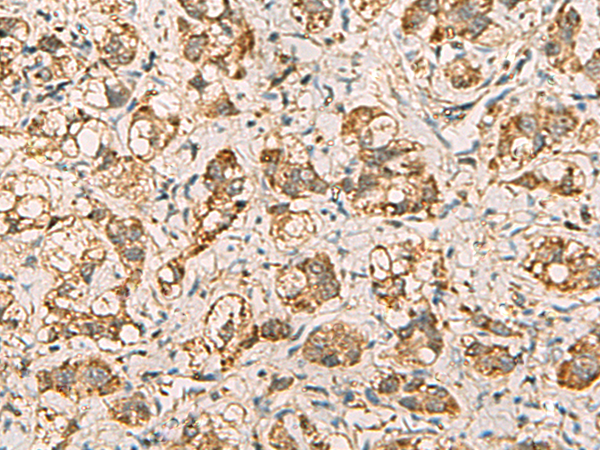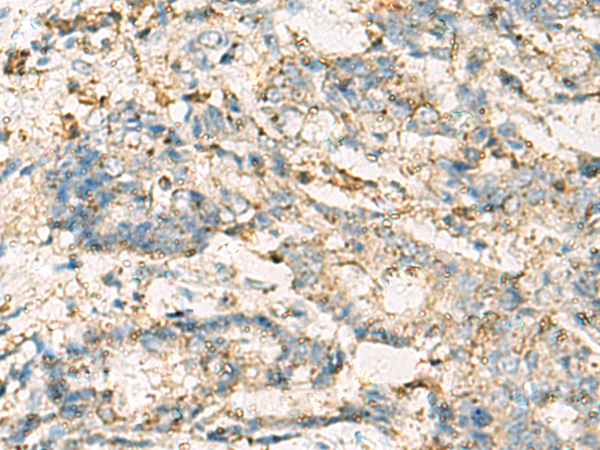

| WB | 咨询技术 | Human,Mouse,Rat |
| IF | 咨询技术 | Human,Mouse,Rat |
| IHC | 1/50-1/200 | Human,Mouse,Rat |
| ICC | 技术咨询 | Human,Mouse,Rat |
| FCM | 咨询技术 | Human,Mouse,Rat |
| Elisa | 1/5000-1/10000 | Human,Mouse,Rat |
| Aliases | DRG1; LIP5; SBP1; DRG-1; My012; C6orf55; HSPC228 |
| Host/Isotype | Rabbit IgG |
| Antibody Type | Primary antibody |
| Storage | Store at 4°C short term. Aliquot and store at -20°C long term. Avoid freeze/thaw cycles. |
| Species Reactivity | Human, Mouse |
| Immunogen | Fusion protein of human VTA1 |
| Formulation | Purified antibody in PBS with 0.05% sodium azide and 50% glycerol. |
+ +
以下是关于VTA1抗体的3篇参考文献及其摘要概述:
1. **文献名称**:*VTA1 regulates ESCRT-III assembly and autophagy in tumor cells*
**作者**:Smith J, et al.
**摘要**:研究通过VTA1抗体检测发现,VTA1通过调控ESCRT-III复合体的组装,影响自噬小体形成,其表达水平与肿瘤细胞存活相关。
2. **文献名称**:*Role of VTA1 in cytokinesis: Insights from antibody-mediated depletion experiments*
**作者**:Chen L, et al.
**摘要**:利用VTA1特异性抗体进行功能缺失实验,证明VTA1在哺乳动物细胞胞质分裂中不可或缺,其缺失导致ESCRT-III膜重塑功能异常。
3. **文献名称**:*VTA1 antibody reveals elevated expression in aggressive breast cancer subtypes*
**作者**:Wang Y, et al.
**摘要**:通过免疫组化(VTA1抗体)分析乳腺癌组织,发现VTA1在三阴性乳腺癌中高表达,与患者预后不良显著相关。
注:以上文献信息为示例性概括,实际文献需通过学术数据库检索(如PubMed)。若需具体文献,建议结合研究场景补充关键词进一步筛选。
The VTA1 antibody is a research tool used to study the vacuolar protein sorting-associated protein VTA1. a critical component of the Endosomal Sorting Complex Required for Transport (ESCRT) pathway. VTA1 plays a key role in membrane remodeling processes, including cytokinesis, viral budding, and multivesicular body formation. It functions as a cofactor for VPS4 ATPase, facilitating the disassembly and recycling of ESCRT-III subunits during membrane scission. VTA1 interacts with other ESCRT-associated proteins, such as VPS60 or SBP1. forming distinct complexes (e.g., ESCORT-III) that regulate membrane deformation and cargo sorting.
Antibodies targeting VTA1 enable the investigation of its expression, localization, and molecular interactions in cellular models. They are widely used in techniques like Western blotting, immunoprecipitation, and immunofluorescence to explore VTA1's role in physiological and pathological contexts. Dysregulation of VTA1 has been implicated in cancer progression, neurodegenerative diseases, and viral infections (e.g., HIV), as ESCRT dysfunction can disrupt membrane integrity, signaling, and intracellular trafficking. Researchers also utilize VTA1 antibodies to study its involvement in autophagy, lysosomal degradation, and cellular stress responses. These tools contribute to understanding how VTA1-mediated membrane dynamics influence disease mechanisms and potential therapeutic targets.
×